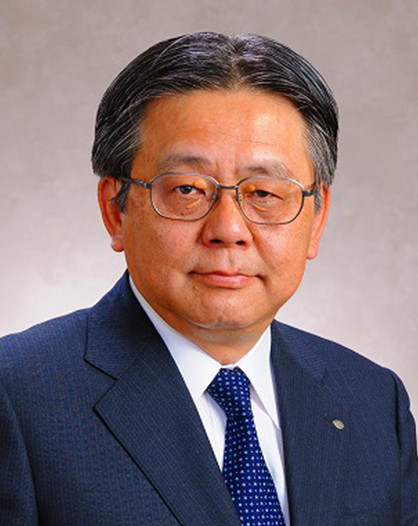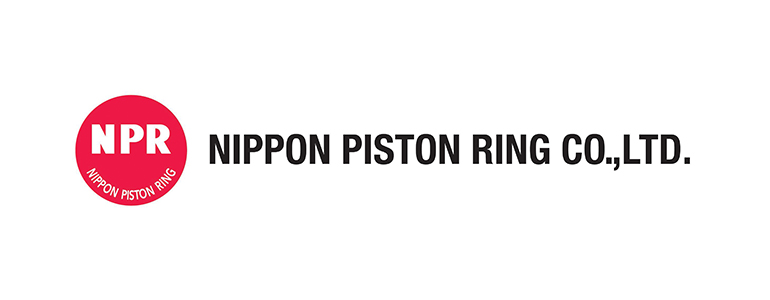| Nippon Piston Ring (6461) |
|
||||||||
Company |
Nippon Piston Ring Co., Ltd. |
||
Code No. |
6461 |
||
Exchange |
TSE First Section |
||
Industry |
Machinery (Manufacturing) |
||
President |
Akira Yamamoto |
||
HQ Address |
5-12-10, Honmachi Higashi, Chuo-ku, Saitama City, Saitama, Japan |
||
Year-end |
March |
||
URL |
|||
*The share price is the closing price on November 22, 2018. The number of shares outstanding and BPS were taken from the latest brief financial report.
ROE is the value for the previous term. |
||||||||||||||||||||||||
|
|
*The definition for net income is net income attributable to owners of parent (Hereinafter the same apply).
*EPS has been adjusted to reflect the reverse stock split of 1 for 10 conducted on October 1, 2015. *A commemorative dividend of ¥1.00 per share in addition to the normal dividend of ¥5.00 was conducted to commemorate the 80th year of Nippon Piston Ring's operations in FY 2014. *Estimates are those of the Company. The Company paid 30.00 yen per share as an interim dividend in FY 2019. |
| Key Points |
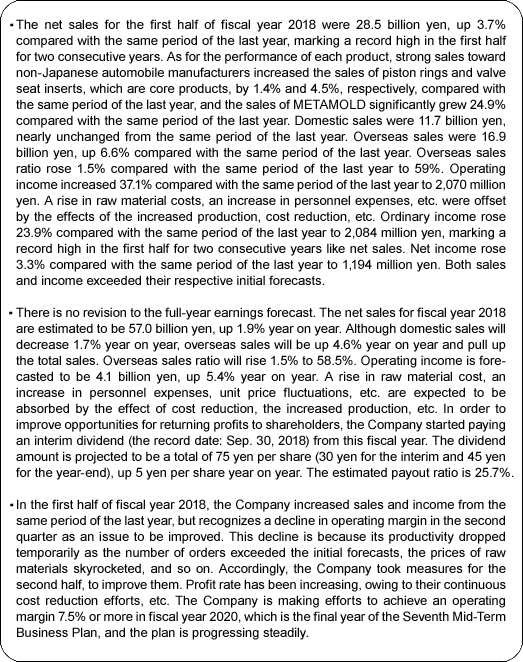 |
| Company Overview |
|
Nippon Piston Ring manufactures and sells piston rings and valve seat inserts which are important functional parts for automobile engines. The Company boasts of a market share just under 30% of piston rings and just under 40% of valve seat inserts supplied to Japanese automobile manufacturers. It supplies its products not only to all Japanese automobile manufacturers but also to many prominent non-Japanese automobile manufacturers.
Nippon Piston Ring boasts of strengths in metallic materials, surface quality improvement and precision processing technologies. Development of new products and business expansion to non-automobile engine parts realms such as METAMOLD (metal injection molding products) and medical products are being strengthened.
<Corporate History>
Nippon Piston Ring was founded by Tomonori Suzuki in 1931 in Kawaguchi City, Saitama Prefecture just prior to the start of mass domestic production of automobiles by manufacturers such as Toyota and Nissan, following the Government program for "establishment of an automobile industry" adopted in August 1935. The company name Nippon Piston Ring Co., Ltd. was officially adopted along with the establishment of the factory in Kawaguchi City in 1934.
During the Second World War, the Company began mass production of chrome plated piston rings for airplanes. At the end of the War in 1945, the factory was temporarily closed, but the Company began operations along with the listing of its shares on the Tokyo Stock Exchange in 1949.
Nippon Piston Ring's earnings expanded rapidly along with the rapid expansion in Japanese automobile exports, and the strong demand for vehicles due to economic growth in the post-war reconstruction within Japan.
Beginning to provide products to German and American automobile manufacturers in the 1970s, the Company has continued organizing a global manufacturing and sales structure, establishing production bases in Thailand, Indonesia, United States, China and India since 2000.
The metal injection molding products business and dental implants business were acquired in 2014 as part of the strategy of expanding its product lineup outside of the automobile engine parts realm, and the Company has started to operate the business by its own facility since 2015.
<Corporate Philosophy>
  <Market Environment>
◎Global Automobile Production Volume
The global production volume of vehicles of less than six tons in gross weight is expected to continue to increase from 95 million in 2017 to 110 million in 2025.
Looking at the details of these estimates, vehicles of less than six tons manufactured in Europe, North America, Japan and other developed economic regions are expected to see the same level. However, the share of vehicles of less than six tons manufactured in China, ASEAN countries, South America, India and other developing economic regions is expected to continue to expand from 51% in 2017 to 59% in 2025. <Market Environment>
◎Global Automobile Production Volume
The global production volume of vehicles of less than six tons in gross weight is expected to continue to increase from 95 million in 2017 to 110 million in 2025.
Looking at the details of these estimates, vehicles of less than six tons manufactured in Europe, North America, Japan and other developed economic regions are expected to see the same level. However, the share of vehicles of less than six tons manufactured in China, ASEAN countries, South America, India and other developing economic regions is expected to continue to expand from 51% in 2017 to 59% in 2025.
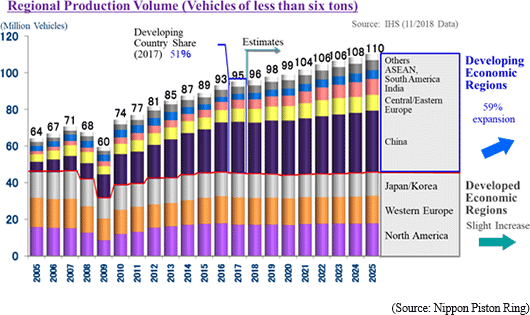 ◎Production Volume by Powertrain (Drive System)
It is projected, regarding the production volume forecast by powertrain (drive system), that the growing environmental awareness will result in a reduction in the share of gasoline and diesel engines, while the share of hybrid vehicles (PHEVs, HEVs) will increase significantly, mainly in developing economic regions. Electric vehicles (EVs), which don't require engines, will account for only 8% in 2025, which means that demand for piston rings and valve seat inserts is expected to continue to show healthy growth. ◎Production Volume by Powertrain (Drive System)
It is projected, regarding the production volume forecast by powertrain (drive system), that the growing environmental awareness will result in a reduction in the share of gasoline and diesel engines, while the share of hybrid vehicles (PHEVs, HEVs) will increase significantly, mainly in developing economic regions. Electric vehicles (EVs), which don't require engines, will account for only 8% in 2025, which means that demand for piston rings and valve seat inserts is expected to continue to show healthy growth.
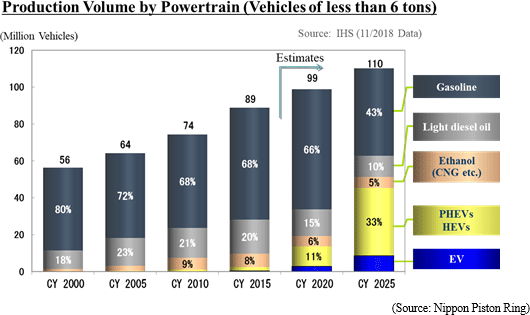 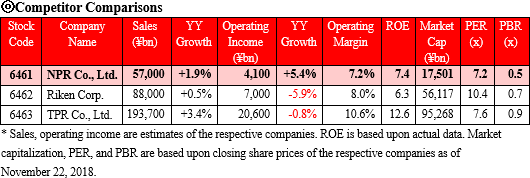 There are three publicly traded companies in Japan that manufacture piston rings, including Nippon Piston Ring, and these companies are operating other businesses respectively. Riken Corporation (6462) boasts of a top share of the piston ring market of close to 50%, but TPR Co., Ltd. (6463) boasts of much larger scale, earnings and market capitalization than the other two companies.
The share price of Nippon Piston Ring (6461) is relatively low, but only this company is expected to increase both sales and income. Their future business operation as well as further increase in its profitability is being watched.
<Business Description>
◎Main Products
As reflected in the Company name, piston rings are one of the main products manufactured. In addition, valve seat inserts and various other automobile parts are manufactured and sold. In fiscal year 2017, automobile related parts accounted for 86.8% of total sales.
At the same time, development of new product and business expansion to non-automobile engine parts realms such as METAMOLD (metal injection molding products) and medical products including dental implant products, which were acquired in 2014 are being strengthened.
There are three publicly traded companies in Japan that manufacture piston rings, including Nippon Piston Ring, and these companies are operating other businesses respectively. Riken Corporation (6462) boasts of a top share of the piston ring market of close to 50%, but TPR Co., Ltd. (6463) boasts of much larger scale, earnings and market capitalization than the other two companies.
The share price of Nippon Piston Ring (6461) is relatively low, but only this company is expected to increase both sales and income. Their future business operation as well as further increase in its profitability is being watched.
<Business Description>
◎Main Products
As reflected in the Company name, piston rings are one of the main products manufactured. In addition, valve seat inserts and various other automobile parts are manufactured and sold. In fiscal year 2017, automobile related parts accounted for 86.8% of total sales.
At the same time, development of new product and business expansion to non-automobile engine parts realms such as METAMOLD (metal injection molding products) and medical products including dental implant products, which were acquired in 2014 are being strengthened.
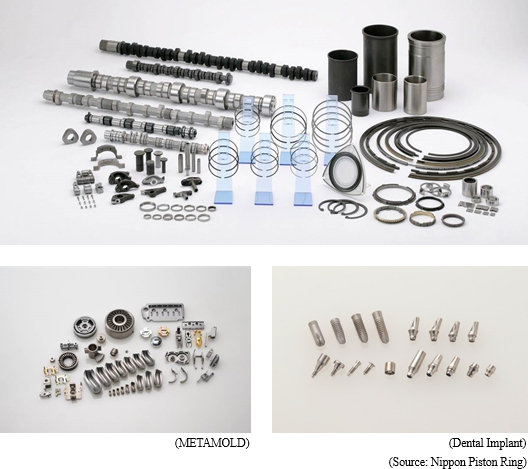 <Product Sales Composition> <Product Sales Composition>
 <Engine Cutaway Diagram> <Engine Cutaway Diagram>
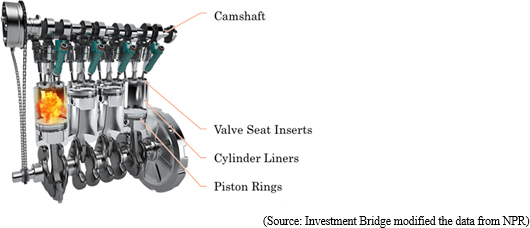 <Piston Rings> <Piston Rings>
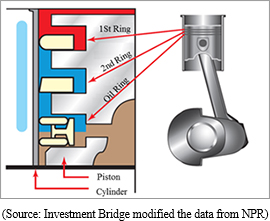 Piston rings are fitted in grooves that run around the circumference of pistons and have spring-like characteristics to act as a seal for ideal combustion within the combustion chamber of the engine cylinders and control lubrication of the piston and cylinder walls by forming precise circles. Moreover, three piston rings are normally used, to form a seal to prevent leakage of oil, allow heat to escape and reduce both friction wear and baking.
Smooth movement of pistons will be impeded and fuel consumption will be negatively impacted should the tensional force of the piston ring placed on pistons be too high. Conversely, loss of power and increased oil consumption will result if the tensional force of the piston ring placed on pistons is too low
Consequently, optimization of the tensional forces of piston rings is crucial in ensuring the optimum performance of internal combustion piston engines.
An oil film is formed between the cylinder wall and pistons to reduce friction wear and baking, which could be caused by the high-speed movement of pistons within a high-heat condition of cylinders. However, it's not thicker the better; piston oil rings need to be designed to ensure that an optimal thickness of oil film is formed. Piston rings are fitted in grooves that run around the circumference of pistons and have spring-like characteristics to act as a seal for ideal combustion within the combustion chamber of the engine cylinders and control lubrication of the piston and cylinder walls by forming precise circles. Moreover, three piston rings are normally used, to form a seal to prevent leakage of oil, allow heat to escape and reduce both friction wear and baking.
Smooth movement of pistons will be impeded and fuel consumption will be negatively impacted should the tensional force of the piston ring placed on pistons be too high. Conversely, loss of power and increased oil consumption will result if the tensional force of the piston ring placed on pistons is too low
Consequently, optimization of the tensional forces of piston rings is crucial in ensuring the optimum performance of internal combustion piston engines.
An oil film is formed between the cylinder wall and pistons to reduce friction wear and baking, which could be caused by the high-speed movement of pistons within a high-heat condition of cylinders. However, it's not thicker the better; piston oil rings need to be designed to ensure that an optimal thickness of oil film is formed.
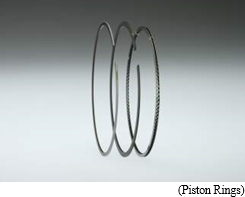 Piston rings are required to provide wear resistance, material strength, heat resistance, heat conductivity, and oil retention capacity to ensure the optimal performance and durability of engines.
In recent years, with the rapid rise in awareness of environment issues, a swift response is vital to adjust to a system that certifies vehicles with low output levels of nitrous oxides and hydrocarbons, and regulations to enforce reductions in a carbon dioxide emission. Consequently, the need for high-performance piston rings that respond to these developments and the need for improvements in fuel consumption are on the rise.
With regards to the characteristics required to piston rings, development of piston rings with low friction construction, thinner width, new surface treatment processes, highly durable and low-cost materials is being conducted. At the same time, development and proposal of optimal design technologies using its tuning technic are also being promoted.
Nippon Piston Ring is one of only few companies that have the ability to stably manufacture and supply piston rings, which, as you may see, require extremely advanced technological capabilities, and are able to consistently develop revolutionary technologies.
<Valve Seat Inserts> Piston rings are required to provide wear resistance, material strength, heat resistance, heat conductivity, and oil retention capacity to ensure the optimal performance and durability of engines.
In recent years, with the rapid rise in awareness of environment issues, a swift response is vital to adjust to a system that certifies vehicles with low output levels of nitrous oxides and hydrocarbons, and regulations to enforce reductions in a carbon dioxide emission. Consequently, the need for high-performance piston rings that respond to these developments and the need for improvements in fuel consumption are on the rise.
With regards to the characteristics required to piston rings, development of piston rings with low friction construction, thinner width, new surface treatment processes, highly durable and low-cost materials is being conducted. At the same time, development and proposal of optimal design technologies using its tuning technic are also being promoted.
Nippon Piston Ring is one of only few companies that have the ability to stably manufacture and supply piston rings, which, as you may see, require extremely advanced technological capabilities, and are able to consistently develop revolutionary technologies.
<Valve Seat Inserts>
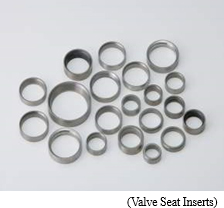 Valve seat inserts are parts which are press-fitted into the valve seating portion of cylinder heads. Valve seat inserts are a very important part made from sintered alloys that boast of high resistance to wear and deterioration under high heat conditions and ensure that a tight seal is formed for clean and efficient combustion. Nippon Piston Ring boasts of quality valve seat inserts that meet the needs of automobile manufacturers at a high level, using a wide range of material variation, leveraging its superior materials development capabilities. Consequently, the Company boasts of a top share of slightly less than 40% of valve seat inserts provided to Japanese automobile manufacturers and it is further expanding its sales to both Japanese and overseas motor vehicle manufacturers.
<Camshafts> Valve seat inserts are parts which are press-fitted into the valve seating portion of cylinder heads. Valve seat inserts are a very important part made from sintered alloys that boast of high resistance to wear and deterioration under high heat conditions and ensure that a tight seal is formed for clean and efficient combustion. Nippon Piston Ring boasts of quality valve seat inserts that meet the needs of automobile manufacturers at a high level, using a wide range of material variation, leveraging its superior materials development capabilities. Consequently, the Company boasts of a top share of slightly less than 40% of valve seat inserts provided to Japanese automobile manufacturers and it is further expanding its sales to both Japanese and overseas motor vehicle manufacturers.
<Camshafts>
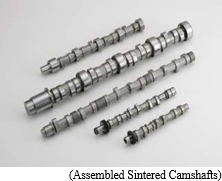 Camshafts are a part designed to open and close the valves for each cylinder in piston engines. Nippon Piston Ring has the original technology for a special camshaft called assembled sintered camshafts, which are lightweight, highly resistant to contact pressure and capable of adopting a wide variety of designs. They are used by SUBARU in all of its self-manufactured engines, as well as used by truck manufacturers, which require highly durable products.
<METAMOLD (Metal injection molding products)> Camshafts are a part designed to open and close the valves for each cylinder in piston engines. Nippon Piston Ring has the original technology for a special camshaft called assembled sintered camshafts, which are lightweight, highly resistant to contact pressure and capable of adopting a wide variety of designs. They are used by SUBARU in all of its self-manufactured engines, as well as used by truck manufacturers, which require highly durable products.
<METAMOLD (Metal injection molding products)>
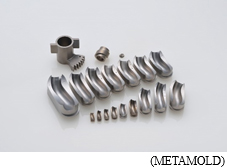 In recent years, various processing technologies and methods, including machine processing, precision casting (lost wax), die casting, and press sintering, have been selected and used for molding metallic parts based on functions and costs required for parts. "METAMOLD," which was developed as a completely new 5th-generation processing technology, is a resource-saving and energy-saving technology that was developed based on the metallurgical technology that the Company has cultivated over years. It has made it possible to manufacture the same complicated shape as plastic products and die-cast products. The Company has expanded the lineup of product groups by strengthening its material and manufacturing technology and expanded its business to not only automobile engine parts but also non-automobile engine parts including industrial mahcinery and office automation parts. Especially, demand for circulation piece for ball screws is increasing.
◎Customers
Nippon Piston Ring supplies piston rings and valve seat inserts to all Japanese automobile manufacturers.
The products supplied by the Company are extremely important in improving the performance of engines and require high levels of technical expertise. In recent years, the need to improve fuel consumption and to seek alternative fuels due to the growing importance of environmental issues has contributed to expanded sales to non-Japanese automobile manufacturers such as European, American and Chinese local automobile manufacturers. In recent years, various processing technologies and methods, including machine processing, precision casting (lost wax), die casting, and press sintering, have been selected and used for molding metallic parts based on functions and costs required for parts. "METAMOLD," which was developed as a completely new 5th-generation processing technology, is a resource-saving and energy-saving technology that was developed based on the metallurgical technology that the Company has cultivated over years. It has made it possible to manufacture the same complicated shape as plastic products and die-cast products. The Company has expanded the lineup of product groups by strengthening its material and manufacturing technology and expanded its business to not only automobile engine parts but also non-automobile engine parts including industrial mahcinery and office automation parts. Especially, demand for circulation piece for ball screws is increasing.
◎Customers
Nippon Piston Ring supplies piston rings and valve seat inserts to all Japanese automobile manufacturers.
The products supplied by the Company are extremely important in improving the performance of engines and require high levels of technical expertise. In recent years, the need to improve fuel consumption and to seek alternative fuels due to the growing importance of environmental issues has contributed to expanded sales to non-Japanese automobile manufacturers such as European, American and Chinese local automobile manufacturers.
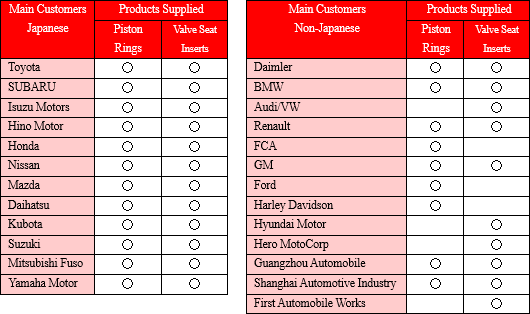 <Production and Sales Bases>
<Japan>
Nippon Piston Ring maintains four production bases and seven sales bases (Tokyo [head office: Saitama City], Nagoya, Osaka, Hiroshima, Fukuoka, Sendai, Sapporo) within Japan. <Production and Sales Bases>
<Japan>
Nippon Piston Ring maintains four production bases and seven sales bases (Tokyo [head office: Saitama City], Nagoya, Osaka, Hiroshima, Fukuoka, Sendai, Sapporo) within Japan.
 <Overseas>
Nippon Piston Ring maintains both manufacturing and sales bases for piston rings, valve seat inserts and other products in the United States, China, ASEAN countries, and India. The Company has sales bases in Germany, Singapore and Malaysia , too. <Overseas>
Nippon Piston Ring maintains both manufacturing and sales bases for piston rings, valve seat inserts and other products in the United States, China, ASEAN countries, and India. The Company has sales bases in Germany, Singapore and Malaysia , too.
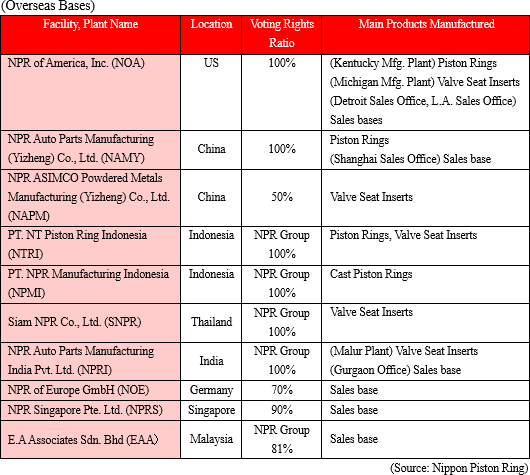 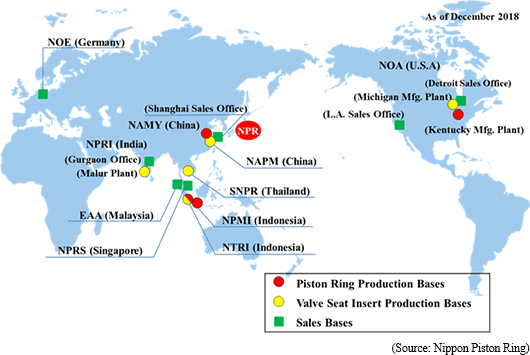 <Characteristics and Strengths>
Nippon Piston Ring's highly advanced technologies and ability to consistently supply highly reliable functional automobile parts maintained throughout its history over 80 years of operations has allowed it to become the choice of both Japanese and overseas automobile manufacturers. In recent years, development of major products, which can contribute to reductions in exhaust gases, low output levels of carbon dioxides and the achievement of "over 50% thermal efficiency rates" in internal combustion engines, is being conducted. <Characteristics and Strengths>
Nippon Piston Ring's highly advanced technologies and ability to consistently supply highly reliable functional automobile parts maintained throughout its history over 80 years of operations has allowed it to become the choice of both Japanese and overseas automobile manufacturers. In recent years, development of major products, which can contribute to reductions in exhaust gases, low output levels of carbon dioxides and the achievement of "over 50% thermal efficiency rates" in internal combustion engines, is being conducted.
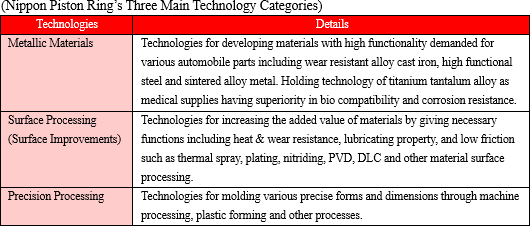 With regards to product development, the ability to combine the said technologies and its simulation technologies applied to engines is one of Nippon Piston Ring's strengths.
In addition, automobile manufacturers, to whose business the Company's high levels of technological expertise are critical, are what the Company calls its "client assets," which are an important part of its corporate value.
With regards to product development, the ability to combine the said technologies and its simulation technologies applied to engines is one of Nippon Piston Ring's strengths.
In addition, automobile manufacturers, to whose business the Company's high levels of technological expertise are critical, are what the Company calls its "client assets," which are an important part of its corporate value.
 ROE decreased 0.8% between fiscal year 2016 and fiscal year 2017. Despite a rise in total asset turnover, net profit margin and leverage declined. We would like to expect ROE to grow, as profitability improves.
ROE decreased 0.8% between fiscal year 2016 and fiscal year 2017. Despite a rise in total asset turnover, net profit margin and leverage declined. We would like to expect ROE to grow, as profitability improves.
|
| First Half of the Fiscal Year 2018 Earnings Overview |
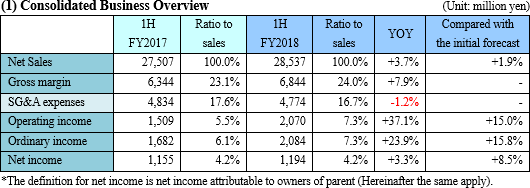 Sales and income grew, exceeding their respective initial forecasts.
The net sales were 28.5 billion yen, up 3.7% compared with the same period of the last year, marking a record high in the first half for two consecutive years. As for the performance of each product, strong sales toward non-Japanese automobile manufacturers increased the sales of piston rings and valve seat inserts, which are core products, by 1.4% and 4.5%, respectively, compared with the same period of the last year, and the sales of METAMOLD significantly grew 24.9% compared with the same period of the last year.
Domestic sales were 11.7 billion yen, nearly unchanged from the same period of the last year. Overseas sales were 16.9 billion yen, up 6.6% compared with the same period of the last year. Overseas sales ratio rose 1.5% compared with the same period of the last year to 59%.
Operating income increased 37.1% compared with the same period of the last year to 2,070 million yen. A rise in raw material costs, an increase in personnel expenses, etc. were offset by the effects of the increased production, cost reduction, etc.
Ordinary income rose 23.9% compared with the same period of the last year to 2,084 million yen, marking a record high in the first half for two consecutive years like net sales. Net income rose 3.3% compared with the same period of the last year to 1,194 million yen.
Both sales and income exceeded their respective initial forecasts. Sales and income grew, exceeding their respective initial forecasts.
The net sales were 28.5 billion yen, up 3.7% compared with the same period of the last year, marking a record high in the first half for two consecutive years. As for the performance of each product, strong sales toward non-Japanese automobile manufacturers increased the sales of piston rings and valve seat inserts, which are core products, by 1.4% and 4.5%, respectively, compared with the same period of the last year, and the sales of METAMOLD significantly grew 24.9% compared with the same period of the last year.
Domestic sales were 11.7 billion yen, nearly unchanged from the same period of the last year. Overseas sales were 16.9 billion yen, up 6.6% compared with the same period of the last year. Overseas sales ratio rose 1.5% compared with the same period of the last year to 59%.
Operating income increased 37.1% compared with the same period of the last year to 2,070 million yen. A rise in raw material costs, an increase in personnel expenses, etc. were offset by the effects of the increased production, cost reduction, etc.
Ordinary income rose 23.9% compared with the same period of the last year to 2,084 million yen, marking a record high in the first half for two consecutive years like net sales. Net income rose 3.3% compared with the same period of the last year to 1,194 million yen.
Both sales and income exceeded their respective initial forecasts.
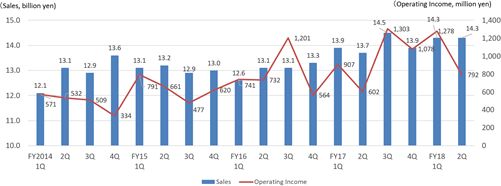  Note: Product classification was changed from the report released in July 2018. (The classification for piston rings for marine engine that were included in "Piston Ring" were reviewed and moved to "Others." In addition, "METAMOLD (Metal injection molding products)," which was previously included in "Others" is now separately shown because its importance has increased.)
For both piston rings and valve seat inserts, the number of orders from non-Japanese automobile manufacturers was favorable. As for METAMOLD, whose business was transferred to the Company in fiscal year 2014, sales grew 24.9% compared with the same period of the last year, because of the increase of orders for the product for industrial machinery. Note: Product classification was changed from the report released in July 2018. (The classification for piston rings for marine engine that were included in "Piston Ring" were reviewed and moved to "Others." In addition, "METAMOLD (Metal injection molding products)," which was previously included in "Others" is now separately shown because its importance has increased.)
For both piston rings and valve seat inserts, the number of orders from non-Japanese automobile manufacturers was favorable. As for METAMOLD, whose business was transferred to the Company in fiscal year 2014, sales grew 24.9% compared with the same period of the last year, because of the increase of orders for the product for industrial machinery.
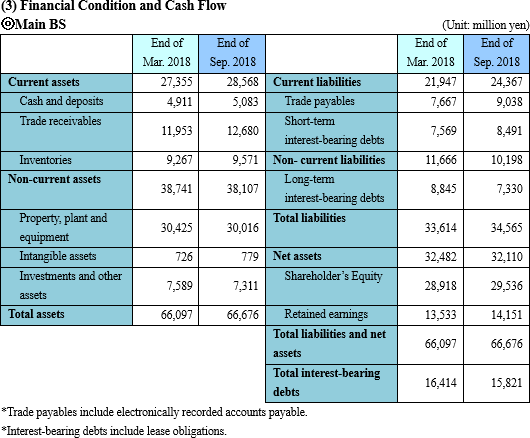 Current assets rose 1.2 billion yen from the end of the previous fiscal year, due to the rise in trade receivables, etc. As property, plant and equipment decreased, non-current assets declined 0.6 billion yen and total assets grew 0.5 billion yen to 66.6 billion yen.
Total liabilities augmented 0.9 billion yen to 34.5 billion yen, as long-term interest-bearing debts decreased, but trade payables augmented. Total interest-bearing debts declined 0.5 billion yen to 15.8 billion yen.
Net assets decreased 0.3 billion yen to 32.1 billion yen, as retained earnings rose, but foreign currency translation adjustment went negative.
As a result, equity ratio declined 1.1% to 47.0% from the end of the previous term.
Interest-bearing debts, net interest-bearing debts and net Debt/Equity ratio fell below those at the end of the previous term
Current assets rose 1.2 billion yen from the end of the previous fiscal year, due to the rise in trade receivables, etc. As property, plant and equipment decreased, non-current assets declined 0.6 billion yen and total assets grew 0.5 billion yen to 66.6 billion yen.
Total liabilities augmented 0.9 billion yen to 34.5 billion yen, as long-term interest-bearing debts decreased, but trade payables augmented. Total interest-bearing debts declined 0.5 billion yen to 15.8 billion yen.
Net assets decreased 0.3 billion yen to 32.1 billion yen, as retained earnings rose, but foreign currency translation adjustment went negative.
As a result, equity ratio declined 1.1% to 47.0% from the end of the previous term.
Interest-bearing debts, net interest-bearing debts and net Debt/Equity ratio fell below those at the end of the previous term
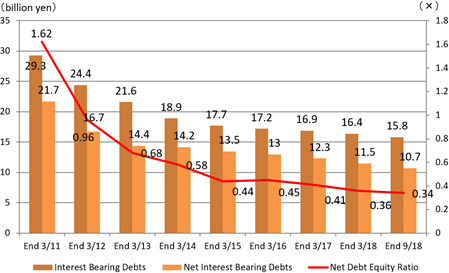  The surplus of operating CF expanded due to the increase in trade payables, etc. Since the purchase of property, plant and equipment decreased, the deficit of investing CF shrank, and then free CF became positive with a significant surplus.
Since the increment of short-term debts decreased compared with the same period of the last year, financing CF went negative, but the cash position improved.
(4) Topics
◎Establishment of Shanghai Sales Office
In order to enhance sales activities in China, the Company established Shanghai Sales Office in Aug. 2018.
Since the Company founded NPR Auto Parts Manufacturing (Yizheng) Co., Ltd. (Yizheng, Jiangsu, China), which manufactures and sells piston rings, in 2005, it has been expanding the scale of production and promoting sales to automobile manufacturers doing business in China. With Shanghai Sales Office, the Company aims to enrich technical services for existing customers and gain new customers.
◎Completion of partial transfer of shares of a subsidiary in Germany
The Company completed the procedure for transferring 30% equity share of its consolidated subsidiary: NPR of Europe GmbH (NOE, location: Germany) to Daido Metal Co., Ltd. (7245).
Both companies determined that the tighter co-operation through capital alliance in NOE would help increase their European sales to OEM makers, and contribute to the stronger market presence in Europe, and also to enhanced business foundation and corporate value of both companies. Consequently, both companies had been performing the procedure for transferring 30% equity share of NOE to Daido Metal, with whom the Company had developed a cooperative relation in the European market, and completed the procedures on Oct. 1, 2018.
The surplus of operating CF expanded due to the increase in trade payables, etc. Since the purchase of property, plant and equipment decreased, the deficit of investing CF shrank, and then free CF became positive with a significant surplus.
Since the increment of short-term debts decreased compared with the same period of the last year, financing CF went negative, but the cash position improved.
(4) Topics
◎Establishment of Shanghai Sales Office
In order to enhance sales activities in China, the Company established Shanghai Sales Office in Aug. 2018.
Since the Company founded NPR Auto Parts Manufacturing (Yizheng) Co., Ltd. (Yizheng, Jiangsu, China), which manufactures and sells piston rings, in 2005, it has been expanding the scale of production and promoting sales to automobile manufacturers doing business in China. With Shanghai Sales Office, the Company aims to enrich technical services for existing customers and gain new customers.
◎Completion of partial transfer of shares of a subsidiary in Germany
The Company completed the procedure for transferring 30% equity share of its consolidated subsidiary: NPR of Europe GmbH (NOE, location: Germany) to Daido Metal Co., Ltd. (7245).
Both companies determined that the tighter co-operation through capital alliance in NOE would help increase their European sales to OEM makers, and contribute to the stronger market presence in Europe, and also to enhanced business foundation and corporate value of both companies. Consequently, both companies had been performing the procedure for transferring 30% equity share of NOE to Daido Metal, with whom the Company had developed a cooperative relation in the European market, and completed the procedures on Oct. 1, 2018.
|
| Fiscal Year 2018 Earnings Forecast |
 No revision to the earnings forecast. Sales and income will increase.
There is no revision to the earnings forecast.
Net sales are estimated to be 57.0 billion yen, up 1.9% year on year. Although domestic sales will decrease 1.7% year on year, overseas sales will be up 4.6% year on year and pull up the total sales.
Overseas sales ratio will rise 1.5% to 58.5%. The foreign exchange rates are assumed to be 105 yen/US dollar and 128 yen/euro.
Operating income is forecasted to be 4.1 billion yen, up 5.4% year on year.
A rise in raw material costs, an increase in personnel expenses, unit price fluctuations, etc. are expected to be absorbed by the effect of cost reduction, the increased production output, etc.
Ordinary income is estimated to be 4.1 billion yen, down 2.1% year on year due to decrease of gain on foreign exchange. Net income is estimated to be 2.4 billion yen, up 5.0% year on year.
In order to improve opportunities for returning profits to shareholders, the Company started paying an interim dividend (Record date: September 30, 2018) from this fiscal year.
The dividend amount is projected to be a total of 75 yen per share (30 yen for the interim and 45 yen for the year-end), up 5 yen per share from the previous year. Payout ratio is estimated to be 25.7%. No revision to the earnings forecast. Sales and income will increase.
There is no revision to the earnings forecast.
Net sales are estimated to be 57.0 billion yen, up 1.9% year on year. Although domestic sales will decrease 1.7% year on year, overseas sales will be up 4.6% year on year and pull up the total sales.
Overseas sales ratio will rise 1.5% to 58.5%. The foreign exchange rates are assumed to be 105 yen/US dollar and 128 yen/euro.
Operating income is forecasted to be 4.1 billion yen, up 5.4% year on year.
A rise in raw material costs, an increase in personnel expenses, unit price fluctuations, etc. are expected to be absorbed by the effect of cost reduction, the increased production output, etc.
Ordinary income is estimated to be 4.1 billion yen, down 2.1% year on year due to decrease of gain on foreign exchange. Net income is estimated to be 2.4 billion yen, up 5.0% year on year.
In order to improve opportunities for returning profits to shareholders, the Company started paying an interim dividend (Record date: September 30, 2018) from this fiscal year.
The dividend amount is projected to be a total of 75 yen per share (30 yen for the interim and 45 yen for the year-end), up 5 yen per share from the previous year. Payout ratio is estimated to be 25.7%.
|
| Interview with President Yamamoto |
|
We asked President Yamamoto about the review of the performance in the first half and the Company's initiatives.
Q: "Could you summarize the business results for the first half of the fiscal year 2018?"
A: "Both sales and operating income in the first half have virtually hit a record high. We will continue to steadily capture demand by promoting sales that is oriented to making and using technical proposals."
The growth rate of the global production volume of vehicles was approximately 2%, but our sales increased by 3.7% compared with the same period of the last year exceeding the initial forecast and marking a record high for the first half.
The operating income in the first half marked the second highest record after that in the first half of fiscal year 2010, however, due to the impact of the bankruptcy of Lehman Brothers, personnel expenses were curtailed in fiscal year 2010, thus, it can be said that the first half of this term has virtually witnessed the highest record. I think we managed to achieve a satisfactory result by steadily capturing demand, and offsetting the increase in personnel expenses and the steep rise in raw material costs.
We were able to steadily obtain orders from non-Japanese automobile manufacturers, not only thanks to customers' recognition of the superb quality of our products, but also due to technical exchange sessions and technical presentations.
We not only hold one-sided presentations about our products, but also provide comprehensive technical services by asking customers about their problems and concerns, devising solutions for them, and performing verifications by actual engine test and so on. This contributed to raising the satisfaction level of customers. We will further conduct such "sales that is oriented to making and using technical proposals."
Q: "It seems that the METAMOLD business is broadly expanding. Please tell us about the progress of the new products business including METAMOLD products."
A: "The METAMOLD business has started to steadily contribute to our business results. We are pushing forward towards mass production of components of medical devices, and we are utilizing Open Innovation to progress with the development of Motor Core."
METAMOLD (metal injection molding products) accounted for 0.1 billion yen out of the 1 billion yen of increase in sales in the first half of fiscal year 2018. The scale of sales is not large yet, but it has started to steadily contribute to our business results. In order to avoid price competition, we are conducting development while focusing on fields that require high technological capabilities, which are unique to us and cannot be copied by other companies, and we are aiming to expand the scope of application.
Since METAMOLD has enabled complex shaped products to be formed as a single unit, like plastic products and die-cast products, and therefore, costs can be reduced, we receive positive responses at exhibitions, etc.
We acquired this business about 4 years ago, and we have been steadily gaining new customers, and we will continue to make efforts toward increasing orders from existing customers and cultivating new customers by using an integrated manufacturing-sales-development structure.
As for the medical field, we are on track towards mass production of electrode materials made from titanium tantalum alloys (Ti-Ta alloys) used in treating Parkinson's disease. Ti-Ta alloys have a high affinity for the medical field, not only thanks to its high biocompatibility, which allows it to reside inside the body for a long time, but also because it is non-magnetic, which makes it suitable for magnetic resonance imaging (MRI) diagnosis, etc. We are going to continue the initiatives towards expanding the scope of its applications as medical equipment. As for dental implants, we have improved its ease of use from the viewpoint of dentists and re-released it as a new brand in October 2018. Currently, we are conducting marketing, for example, by providing samples to dentists, clinics, universities, etc.
We are focusing our efforts on acquiring peripheral technologies needed to proceed with the development of the Motor Core aimed at the power electronics market.
From the viewpoints of development speed and the pursuit of expertise, we are utilizing Open Innovation and having various styles of debate such as industry-academia and business-to-business to build a database of knowledge while identifying issues.
While nurturing this new products business, I feel that we have attained thinking and behavior for marketing, which has never been one of our strong points by any means.
Additionally, the fact that we receive fresh stimulus from outside of the company by Open Innovation will probably bring great benefit to our company in the future.
Q: "Please tell us about the progress of cultivating human resources initiatives, which is one of the missions you give the most importance."
A: "We are holding discussions about a more fundamental part for pursuing a company that has a comfortable work environment. Also, we will proactively continue the operation of our `internal college for manufacturing,' which plays a massive role in cultivating human resources as a significant institution for development of human resources, which contributes to the forming and fostering of corporate culture. "
We are holding discussions about a more fundamental part for pursuing "a company that has a comfortable work environment." Deepening understanding about our products among not only the employees but also their families and neighborhoods is considered the first step, thus, as one of the initiatives to achieve that, we displayed a demonstration racing car equipped with our products in our 3 domestic plants and their surrounding facilities. We hope that such initiatives can help raise job satisfaction and motivation of the employees, and we will be increasing the chances to do them in the future.
Moreover, our "internal college for manufacturing," which plays a massive role in cultivating human resources, has been open for 17 terms, and has produced nearly 100 graduates. Now many graduates are placed at each manufacturing bases including overseas.
We will proactively continue its operation as a significant institution for development of human resources, which not only passes down technical skills but also contributes to the forming and fostering of corporate culture.
|
| Conclusions |
|
In the first half of fiscal year 2018, the Company increased sales and income from the same period of the last year, but recognizes a decline in operating margin in the second quarter as an issue to be improved. This decline is because its productivity dropped temporarily as the number of orders exceeded the initial forecasts, the prices of raw materials skyrocketed, and so on. Accordingly, the Company took measures for the second half, to improve them.
Profit rate has been increasing, owing to their continuous cost reduction efforts, etc. The Company is making efforts to achieve an operating margin 7.5% or more in fiscal year 2020, which is the final year of the Seventh Mid-Term Business Plan, and the plan is progressing steadily.
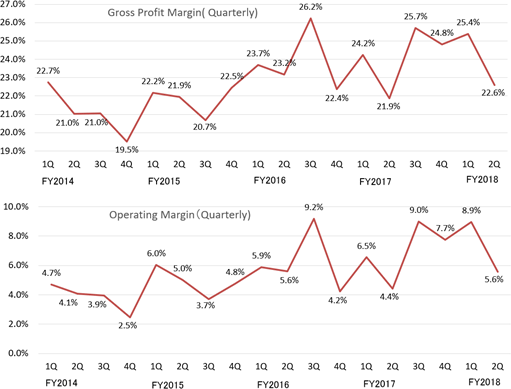 |
| <Reference1: Overview of the Seventh Mid-Term Business Plan> |
|
◎Overview of the Seventh Mid-Term Business Plan (FY 2018 to FY 2020)
The basic policy, main initiatives and targets of the Seventh Mid-Term Business Plan, which is the 3-year plan starting this fiscal year, are as follows:
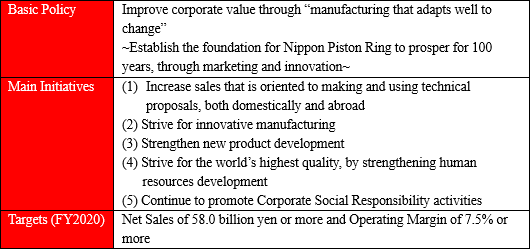 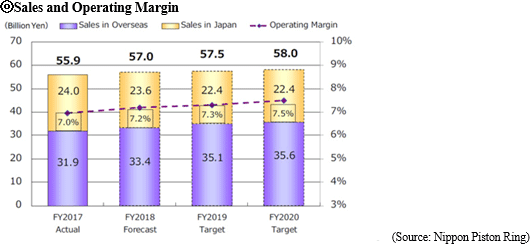 The foreign exchange rates are set at 105 yen/US dollar and 128 yen/euro, and the net sales target for fiscal year 2020 is set at 58.0 billion yen or more. In addition, the target of overseas sales ratio is 61%, and sales to non-Japanese automobile manufacturers are expected to increase. Regarding profit, the Company aims to achieve an operating margin of 7.5% or more by promoting cost reduction activities including innovative manufacturing.
The foreign exchange rates are set at 105 yen/US dollar and 128 yen/euro, and the net sales target for fiscal year 2020 is set at 58.0 billion yen or more. In addition, the target of overseas sales ratio is 61%, and sales to non-Japanese automobile manufacturers are expected to increase. Regarding profit, the Company aims to achieve an operating margin of 7.5% or more by promoting cost reduction activities including innovative manufacturing.
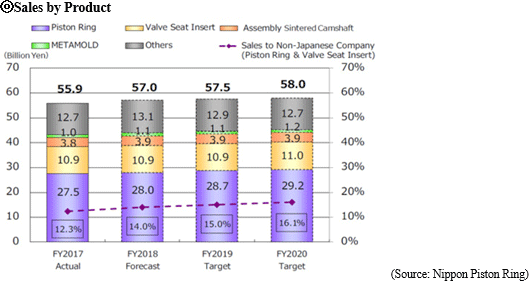 The sales ratio of piston ring and valve seat insert, which are the Company's core products and are sold globally, to non-Japanese automobile manufacturers will continue to increase. In addition, sales of METAMOLD other than automobile engine parts will also expand.
The sales ratio of piston ring and valve seat insert, which are the Company's core products and are sold globally, to non-Japanese automobile manufacturers will continue to increase. In addition, sales of METAMOLD other than automobile engine parts will also expand.
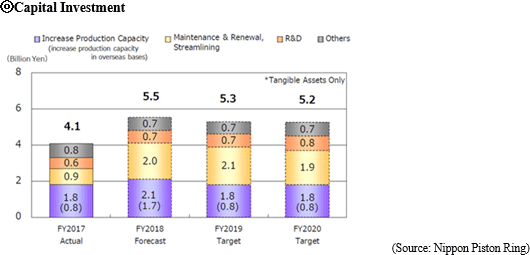 Capital investment will be focused on increase production capacity, and maintenance & renewal, streamlining.
Capital investment will be focused on increase production capacity, and maintenance & renewal, streamlining.
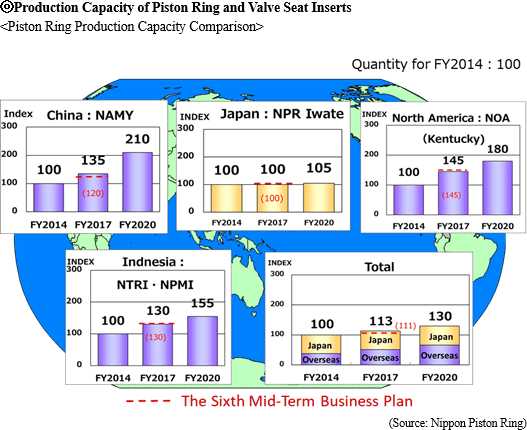 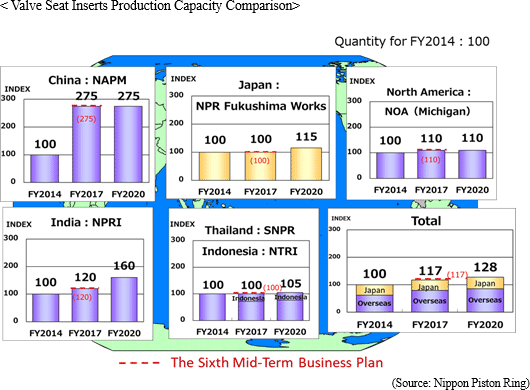 The production capacity of piston rings in fiscal year 2020 will be further expanded at all production bases compared with fiscal year 2017, and that of valve seat inserts will increase in Japan, India and Thailand.
The production capacity of piston rings in fiscal year 2020 will be further expanded at all production bases compared with fiscal year 2017, and that of valve seat inserts will increase in Japan, India and Thailand.
|
| <Reference: Corporate Governance> |
 ◎Corporate Governance Report
Last modified: December 21, 2018. ◎Corporate Governance Report
Last modified: December 21, 2018.
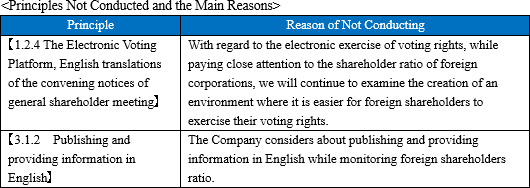 The Company appreciates the need for foreign investors to understand the business models better and continues to plan to proceed with more active publishing in English.
The Company appreciates the need for foreign investors to understand the business models better and continues to plan to proceed with more active publishing in English.
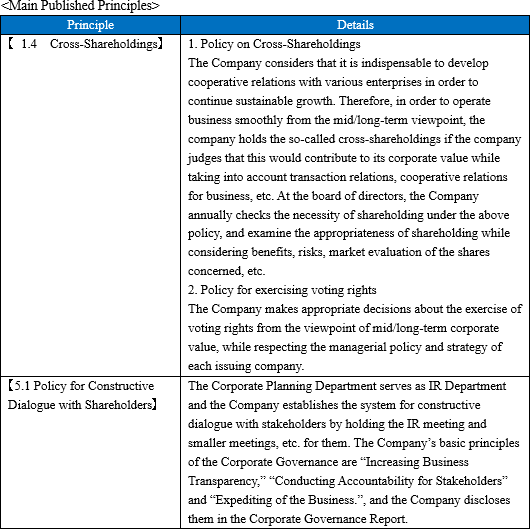 Disclaimer
This report is intended solely for information purposes, and is not intended as a solicitation for investment. The information and opinions contained within this report are made by our company based on data made publicly available, and the information within this report comes from sources that we judge to be reliable. However, we cannot wholly guarantee the accuracy or completeness of the data. This report is not a guarantee of the accuracy, completeness or validity of said information and opinions, nor do we bear any responsibility for the same. All rights pertaining to this report belong to Investment Bridge Co., Ltd., which may change the contents thereof at any time without prior notice. All investment decisions are the responsibility of the individual and should be made only after proper consideration.Copyright (C) 2018 Investment Bridge Co., Ltd. All Rights Reserved. |

